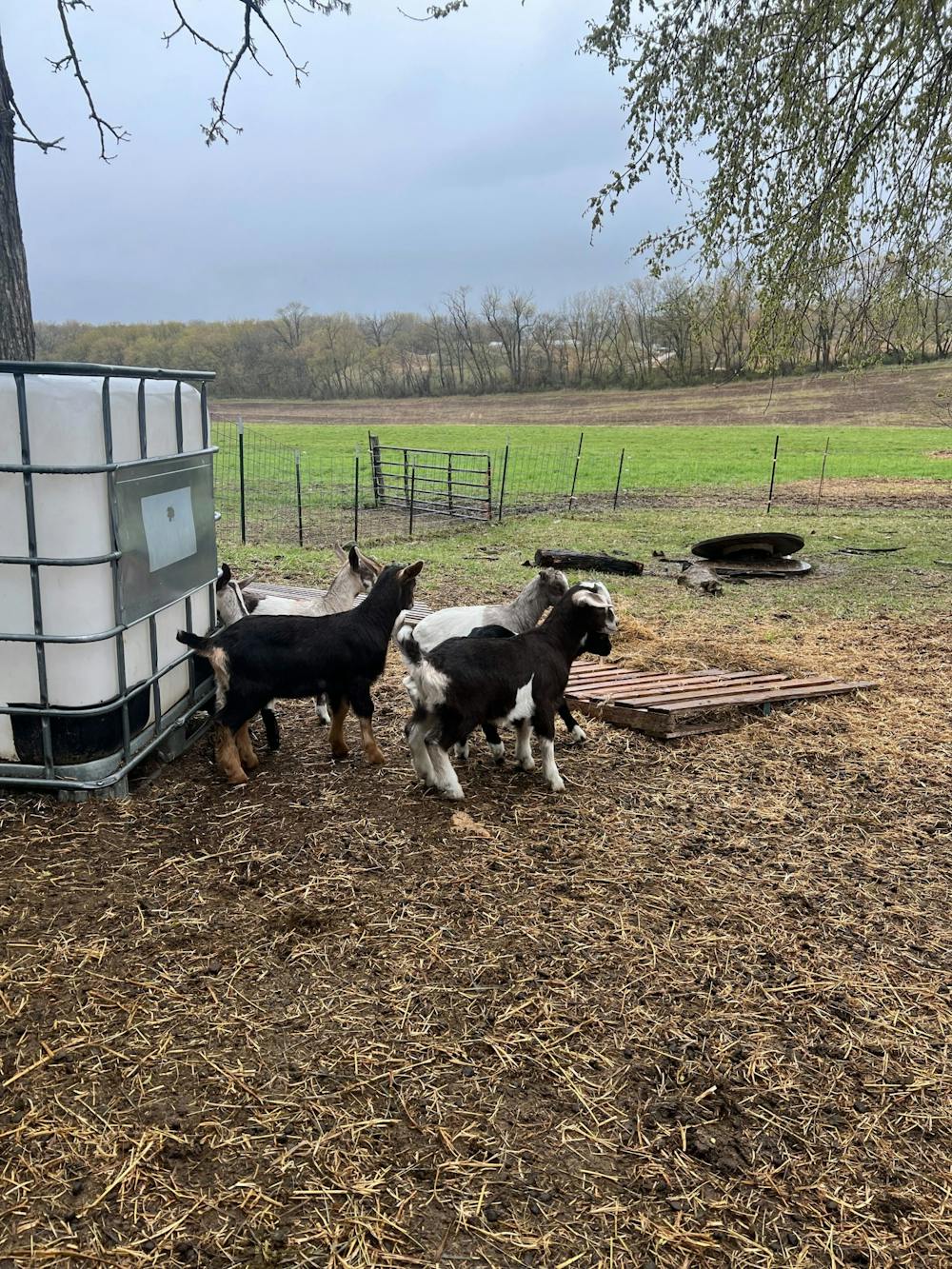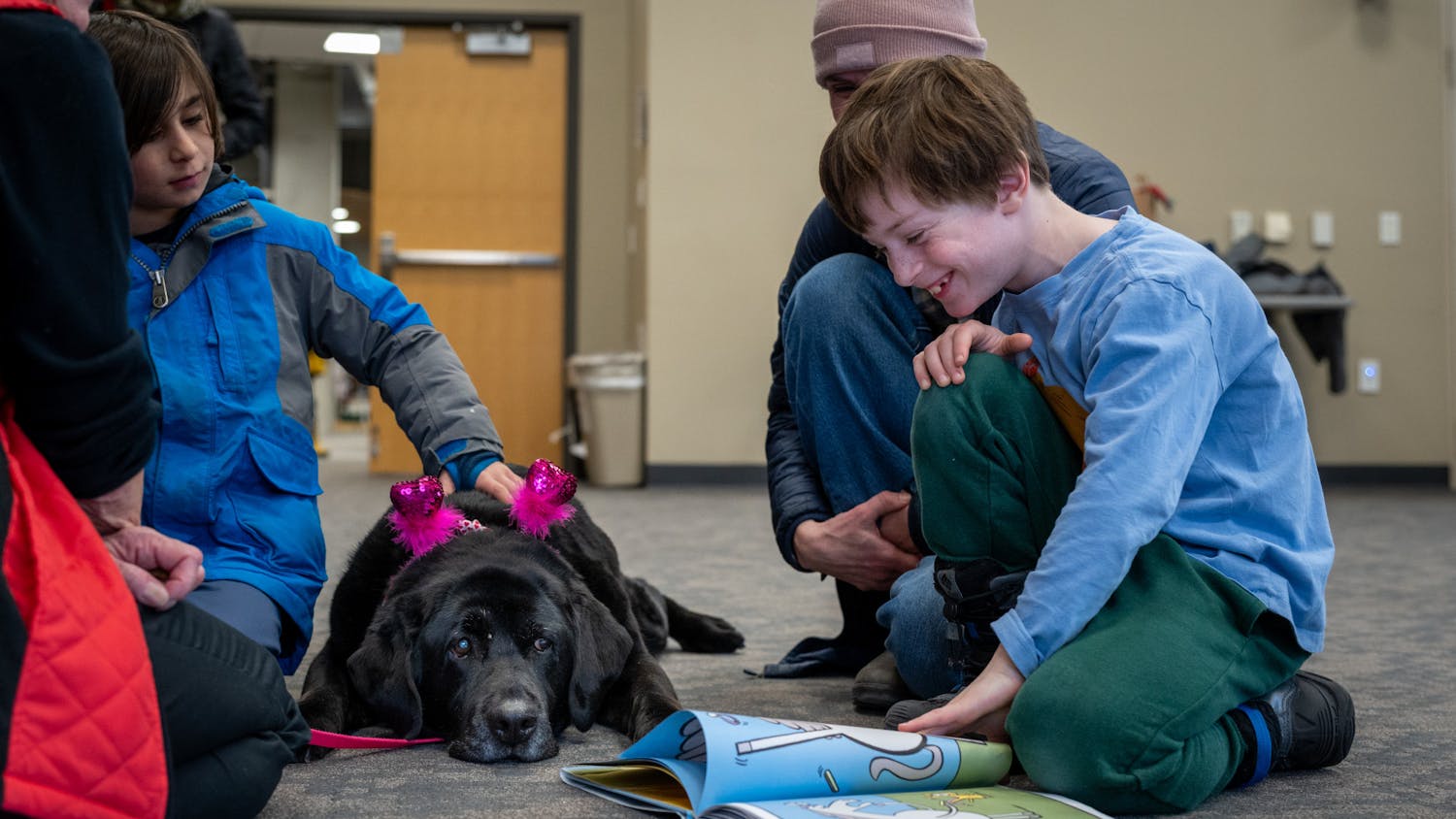For most people, it’s easier to walk into their local grocery store and purchase affordable food than it is to buy food from a farmers market.
While there are a growing number of Americans who care about their food brand’s sustainability, only 34% of American consumers believe sustainability has an impact on their purchases, according to a 2020 International Food Information Council survey.
The Parisi Family Farm tackles this issue head on.
A hidden gem located just north of Stoughton, the farm aims to practice organic agriculture and promote their cause to others.
Terry Parisi and her husband Ronaldo lived in Madison when they saw an opportunity to rent a charming white house at 3718 Halverson Road. They took a chance and moved in with their family in 1990, Parisi said.
Terry and Ronaldo were not farmers — nor did they have any vision to live in the countryside — before moving away from the city, according to Parisi.
“The farm came with 100 acres,” Parisi said. “That was a lot of responsibility for us because my husband was a nurse and I was a teacher.”
When Parisi, Ronaldo and their son Franco started farming, they were only renting the house, not the farmland. The owner who rented the house rented out his farmland to conventional farmers who grew corn, soybeans and wheat.
Once the Parisis bought the farm 1996, they continued to rent out the land to conventional farmers. But the family knew they eventually wanted to switch.
Their farm finally became certified organic in 2004 and joined FairShare, part of the Community Supported Agriculture Coalition (CSA), according to Parisi.
“We were pretty vulnerable, but we also knew we wanted to do it right,” she said.
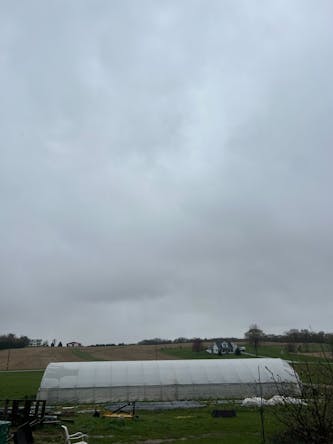
Parisi Family Farm landscape on April 30, 2023.
The root of the issue
The family farm sells organic vegetables and grass-fed cattle to their local market, according to Parisi. The couple has also taken care of goats for nearly 10 years to produce milk and soap, Parisi added.
Although the organic farming life is rewarding for Parisi, many farmers still rely on traditional methods of farming. Out of 900 million arable acres in the U.S, only 1.5% is being farmed regeneratively, according to Reauters.
But these farmers hurt their surrounding environment and soil, Parisi said.
“When you farm conventionally, there are no microorganisms in the soil anymore because they die from herbicides and pesticides,” she explained. “You have to buy fertilizer because nothing can grow anymore,” she said.
Parisi identified tilling and disking as two main conventional farming practices she tries to avoid as an organic farmer.
Tilling is a farming method in which a tiller effectively breaks up soil by turning it over. It prepares the soil for planting by removing weeds. Additionally, it is highly disruptive to the structure of the soil and can increase nutrient runoff and greenhouse gas emissions, according to the USDA.
Disking is a similar type of practice to prepare soil for planting; unlike tilling, it uses a circular disc to mix the soil. Disking uses herbicides and can increase agricultural clods, according to Nebraska’s Institute of Agriculture and Natural Resources.
“We're losing topsoil, good topsoil, we're losing every day, just from those practices of disking and tilling on windy days,” Parisi said.
Outgrowing conventional techniques
When the Parisis planned to convert their farm to organic, the Natural Resource Conservation Service (NRCS) helped map out a pasture and a pollinated habitat that was 7.5 acres, according to Parisi.
Their farm practices a regenerative agriculture method to utilize composting, support cover-cropping and withdraw from tilling. Regenerative agriculture is a transformative farming innovation which focuses on replenishing the soil, restoring biodiversity and producing high-quality food” according to the Syngenta Group.
“I get two or three huge loads of compost — I buy from a place called Purple Cow — they bring them in a truck and I use that to mix with my soil to plant my rows,” Parisi said.
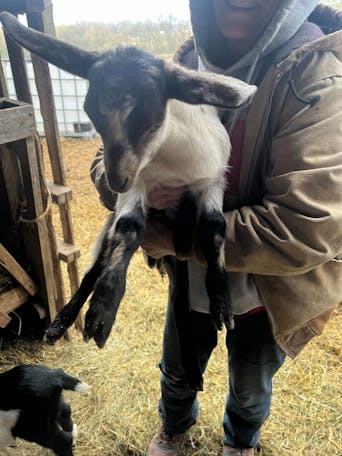
Terry Parisi picks up baby goat from the farm on April 30, 2023.
Moreover, they have been able to grow 40 different vegetables purchased only from organic-certified seeds, according to Parisi.
“Having all this greenery is soaking in all that extra carbon in the air,” she said. “When [farmers have] just plain soil, there is no sequestration happening.”
Parisi’s operation of different plants is a form of permaculture, meaning there is an abundance of diversity and usage of natural resources in the farm, according to Parisi.
“We have rows of trees [and] berry bushes between our plots of land that we grow vegetables on,” she said. “It keeps the wind down [so] we don't have that wind washing away our soil.”
Their second primary organic procedure is known as cover cropping — a process where farmers plant crops such as rye to cover the soil for protection and reinvigorate nutrients for future plantings, according to the USDA.
“Where we planted cover crop and were able to get it in [during] the fall, you aren't gonna see dandelions, you're not gonna see rag-weed, you're not gonna see creeping-charlie — you are gonna see winter rye,” Parisi said.
Cover cropping increases yield crop, soil health and crop diversity, according to the Sustainable Agricultural Research and Education program .
“Cover cropping is huge now with organic farming because it replenishes the Earth with good nutrients,” Parisi said. “They call it green manure.”
To prevent using tillage, the Parisi Family Farm also employs reusable tarps to cover the soil and improve its health. Tarping will also kill weeds and control soil moisture, according to Cornell CALS.
“The more you leave the soil alone, the better off it is,” Parisi noted.
“It is super easy to take that tractor, hook up that disk, and just plow, and just tear up that soil, it is a lot easier than what we are doing now, laying out tarps, and watching them blow away and finding those tarps and bringing them back to land, [it] is not even someone at a bigger organic farm wants to do, but they are doing it,” she added.
Additionally, the farm utilizes a soil block maker to compress soil for planting seeds rather than using traditional trays or pots, according to Parisi. This reduces the usage of plastic for storing seedlings.
“I want more of us sustainable farmers to get off the plastic kick,” she said.
Parisi recounted when they tilled the land while installing their pasture. A big rainstorm came, causing major erosion.
“It was the worst thing we could have ever done for that property, because that rain came, you don't know when those torrential rains come, they come out of nowhere, and it just washed away so much soil,” she said. “It was heartbreaking, it was like why did we do this?”
Getting a moo-ve on
Parisi admits that changing from conventional to organic is a long and difficult process, but it’s worthwhile in the end.
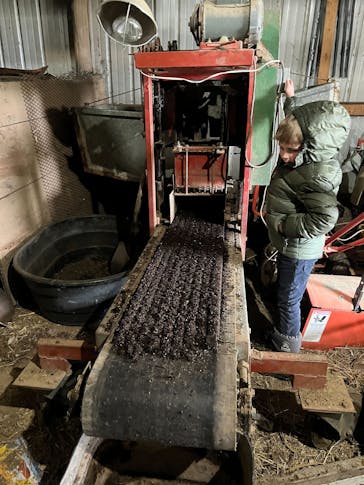
Terry Parisi's grandson Milo operates soil-block machine on April 30, 2023.
“It's just a change in what you know, and it would require you to learn something different,” Parisi added. “There's a lot of farmers that are just afraid to learn something different until they can be convinced that it is a better way.”
Parisi has confidence that the government and Wisconsinites will work to encourage organic agriculture in the state.
The Farm Bill, passed in 1933, still serves to support farmers and conservation efforts in the United States. Additionally, the Organic Certification Cost Share Program (OCCSP) has helped organic farmers pay for their certification.
Gov. Tony Evers proposed a $43 million investment into Wisconsin’s agriculture economy to expand the market, strengthen the workforce, connect local producers to food banks and increase farmer-led conservation.
“The government is writing grants and supporting farmers to change the way,” Parisi said. “I am hopeful that small farms can survive. I hope having leaders like Governor Evers, they understand, they understand it is important.”
But in Parisi’s eyes, there’s still work to be done. Food Insight revealed in 2022 that only 19% of survey respondents heard of the term “regenerative agriculture” and 33% the term “soil health.”
Parisi is determined to uphold organic agriculture through communal conversation and providing encouragement to farmers.
“We can fix this, but we have to do it collectively, small farms aren’t going to be enough to do it,” she said. “If we are going to leave it to the farmers to fix it, then support them.”
Parisi is optimistic that as more individuals engage in sustainability conversations, they will be more inclined to show support for their local farmers market.
“Each one can reach one, because we have to do it,” she said.
“Instead of doing easy one-stop shopping, support your local farmers market, support CSAs — recognize that it is not an option anymore, we have to do it if we want to save the planet.”
Ava Menkes is a former managing editor for The Daily Cardinal. She previously served as the state news editor. She has covered multiple elections, legislative redistricting, healthcare and campus news. She also led 2024 presidential coverage and a project on news deserts. She previously interned with Wisconsin Watch and Isthmus, and will report with The Nation in 2025 on foreign policy and immigration. Follow her on Twitter at @AvaMenkes.

